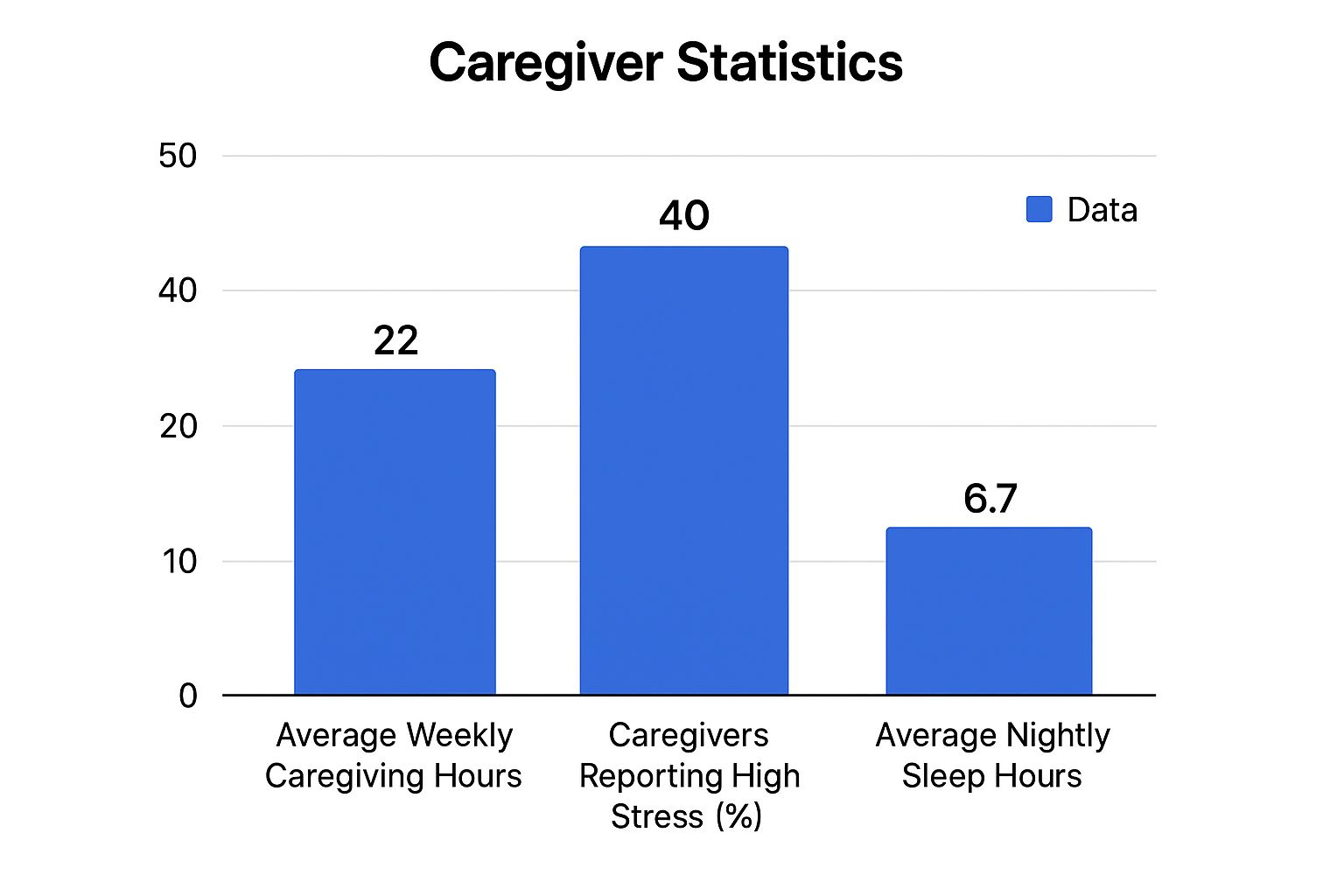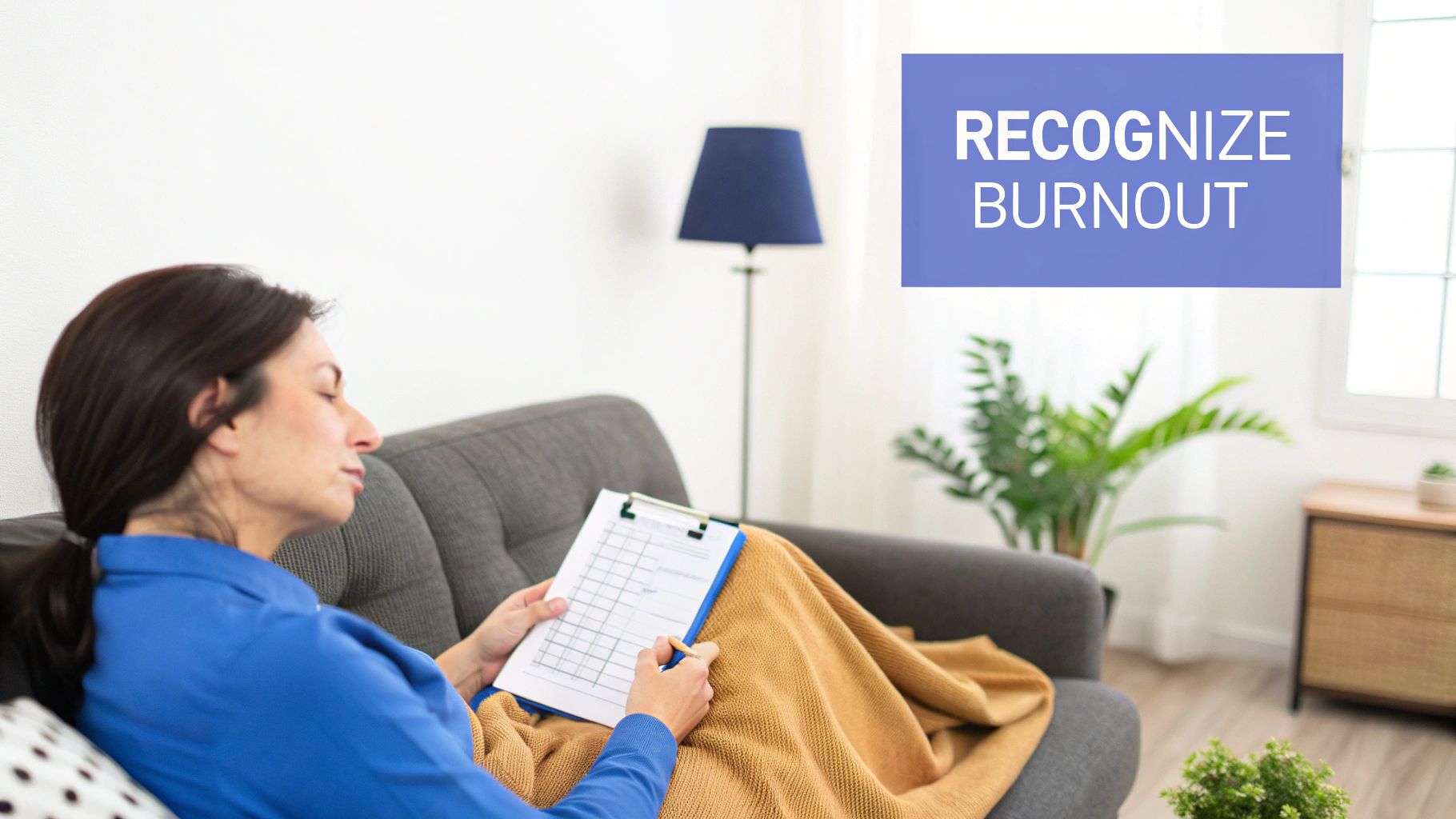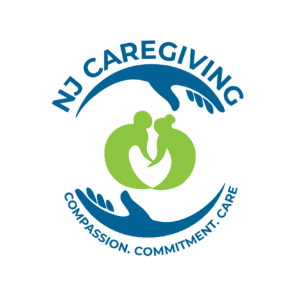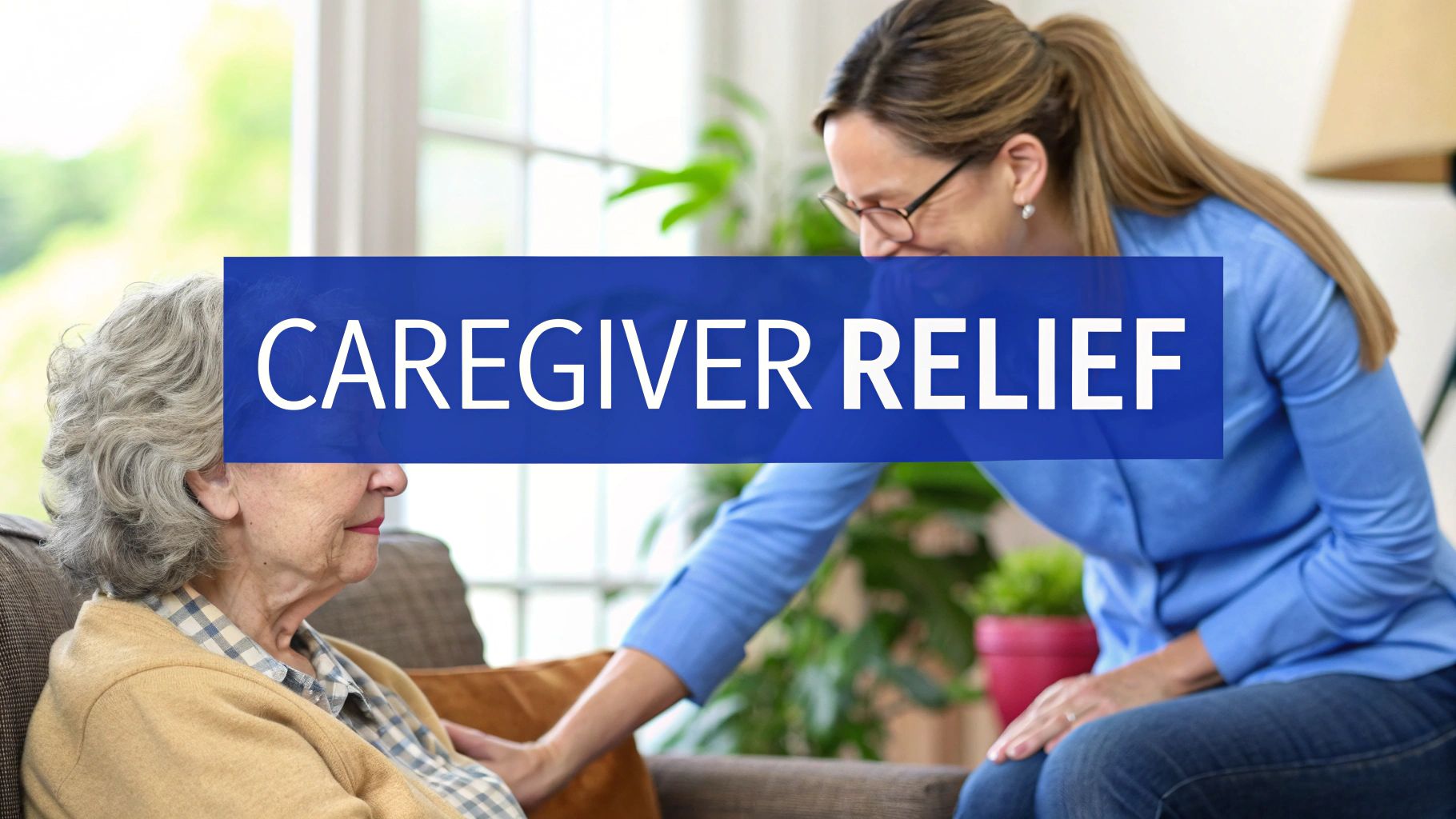Let's be honest: dealing with caregiver stress is so much more than just feeling a little tired. It's about the enormous emotional, physical, and mental weight you carry, day in and day out. The most important thing to remember is that these feelings aren't a sign of failure. They are a perfectly normal response to an incredibly demanding job. Accepting that is the first real step toward finding relief.
Understanding the Weight of Caregiver Stress
Being a caregiver is rewarding, no doubt. But it's also filled with unspoken challenges that can pile up. The constant worry, the nights of broken sleep, and the feeling that your own life is perpetually on hold—it all adds up to a heavy burden. It’s a weight that so many of us carry in silence, pushing our own needs to the back burner.
This isn't just about juggling appointments and medications. It's about navigating a complex and often turbulent emotional landscape. You might feel a whirlwind of love, guilt, frustration, and deep sadness, sometimes all within the same hour. Those feelings are completely valid, and you're not alone in experiencing them.
Recognizing the Early Signs of Burnout
Caregiver stress is sneaky. It often creeps up on us in ways we don't immediately connect to our caregiving role. It’s more than simple exhaustion; it's a slow, quiet erosion of your well-being. Spotting these signs early is your best defense against hitting a wall.
Before things reach a breaking point, our bodies and minds send out warning signals. It's crucial to learn how to recognize these indicators for what they are—a cry for help.
Early Warning Signs of Caregiver Stress
This table breaks down some of the most common red flags. Think of it as a quick self-check to see if the pressure is getting to be too much.
| Physical Signs | Emotional Signs | Behavioral Signs |
|---|---|---|
| Frequent headaches or body aches | Constant irritability or anger | Withdrawing from friends and hobbies |
| Changes in appetite or weight | Feeling hopeless or overwhelmed | Changes in sleep patterns |
| Getting sick more often | Loss of interest in things you enjoyed | Relying on unhealthy coping habits |
| Constant exhaustion | Mood swings and anxiety | Neglecting your own needs |
Seeing yourself in any of these columns isn't a reason to feel guilty. It's a sign that you need to prioritize your own well-being—not just for yourself, but for the person you're caring for, too.
For a more detailed look at the specific challenges you might be facing, our Guide to Navigating Caregiving in New Jersey can offer more localized insights.
The Data Behind the Struggle
If you feel like you’re at your breaking point, the numbers show you’re far from alone. The intense demands placed on caregivers are staggering, and this infographic paints a very clear picture of the reality.

It’s no surprise that long hours spent caregiving lead directly to higher stress levels and not nearly enough sleep. It’s a vicious cycle that can quickly lead to burnout. In fact, research confirms that between 40% and 70% of family caregivers show clinical symptoms of depression. The data just reinforces what so many of us feel every day.
The truth is, you can’t pour from an empty cup. Acknowledging the depth of caregiver stress isn't about wallowing in negativity. It’s about giving yourself permission to find the support and strategies you desperately need to refill your own reserves.
Pinpointing Your Personal Stress Triggers

To start getting a handle on caregiver stress, you first have to play detective. The mission? To figure out what’s really causing the strain. So often, the sources are hiding in plain sight, buried in our day-to-day routines.
It’s one thing to feel vaguely overwhelmed, but that’s a tough enemy to fight. When you can actually name your specific triggers, you can start to build a real strategy to disarm them.
A surprisingly powerful tool for this is a simple "stress diary." For just one week, grab a small notebook or use a notes app on your phone. You're not writing a novel here—the goal is to quickly capture those moments of frustration, anxiety, or pure exhaustion as they happen.
What to Track in Your Stress Diary
When you feel that familiar spike of stress, just take 30 seconds to jot down a few key details. It’s amazing what patterns start to pop out after just a few days.
- The Situation: What was going on right before you felt stressed? (e.g., "Phone rang while I was trying to get Mom to eat," or "Another medical bill showed up in the mail.")
- Your Feeling: Try to name the main emotion. Was it anger? Guilt? Sadness? Or just that bone-deep exhaustion?
- Your Reaction: What did you do? (e.g., "Snapped at my brother on the phone," "Felt my shoulders tighten up to my ears," "Ate an entire bag of chips without thinking.")
After a week of this, you’ll start to see a much clearer picture. You'll move beyond the generic "I'm always stressed" to specific insights like, "I feel most stressed when I have to deal with insurance paperwork," or "I get really irritable when my evenings are constantly interrupted."
This clarity is the first real step toward getting some control back. You might realize that the financial pressure is a much bigger trigger than the physical tasks, or that those difficult family phone calls are what you dread the most.
Identifying your specific stressors is like creating a personalized map of your emotional landscape. It shows you exactly where the pitfalls are, giving you the power to navigate around them or build bridges over them.
Common but Hidden Stress Triggers
As you look over your diary, keep an eye out for themes that repeat themselves. I’ve seen countless caregivers who are shocked to find their biggest stressors aren’t what they thought they were.
Some of the most common, yet often overlooked, triggers include:
- Constant Interruptions: The inability to complete a single, simple task—even just making a cup of tea—without being needed.
- Emotional Toll: The profound sadness that comes with watching a loved one's health decline. This is a very real thing called anticipatory grief.
- Family Dynamics: Feeling like you have no support from siblings or having to deal with relatives who criticize your caregiving from a distance.
- Loss of Self: That slow, creeping realization that you've forgotten who you were before "caregiver" became your primary identity.
Recognizing these specific friction points is a game-changer. It helps you shift from just reacting to one crisis after another to proactively managing your life. Once you’ve pinpointed that the 5 p.m. hour is always chaotic, you can start brainstorming solutions for that specific window of time. Suddenly, the whole mountain of caregiver stress starts to feel a lot more manageable.
Finding Balance Between Caregiving and Your Life

Juggling a career, your friendships, and the immense duties of caregiving can feel like an impossible balancing act. It's a common feeling among caregivers—that you’re constantly dropping one ball to keep another in the air.
But finding a sustainable rhythm isn't about achieving some perfect, mythical balance every single day. It’s about making small, intentional shifts to reclaim pieces of your life, one step at a time.
This struggle is incredibly widespread, especially for those trying to hold down a job. The reality is that 61% of family caregivers also work full- or part-time, and a staggering 67% of them report struggling to maintain a healthy work-life balance. When you consider that caregivers spend an average of 26 hours per week on their duties—the equivalent of a second part-time job—it’s no wonder so many feel completely overwhelmed. You can learn more about these caregiver statistics and trends to see just how common this challenge is.
Creating More Space in Your Schedule
One of the most powerful ways to cope with the pressure is to get smarter with your time. Instead of letting an endless to-do list dictate your every move, you can use a few proven techniques to regain a sense of control.
A fantastic method I've seen work wonders is task batching. Think about it: instead of running to the pharmacy on Monday, the grocery store on Tuesday, and a doctor's appointment on Thursday, look at your week as a whole. Can you group all your errands into one dedicated afternoon? This simple shift saves travel time and, more importantly, precious mental energy.
Another key is to schedule your personal downtime with the same seriousness you give to a medical appointment.
Block out "me time" on your calendar—even if it's just 15 minutes to start—and protect it fiercely. This isn't a luxury. It's a vital part of your caregiving toolkit that keeps burnout at bay.
Negotiating Help with Your Family
Feeling like you’re carrying the entire weight of caregiving is a huge source of stress and resentment. Having constructive conversations with family members to share the load is absolutely essential, but it can be a delicate process. The secret is to come to the table prepared and be very specific.
Instead of a vague, emotional plea like, "I need more help," approach the conversation with a clear plan.
- Make a List First: Before you even think about talking to anyone, write down all the tasks involved in your loved one's care. I mean everything—from medication management and paying bills to doing laundry and meal prep. Seeing it on paper is often an eye-opener.
- Propose Specific Tasks: Present your siblings or other relatives with concrete, manageable options. For instance: "Could you take over managing all the prescription refills online?" or "Would you be able to handle the grocery shopping every other week?"
- Use 'I' Statements: Frame the conversation around your feelings and needs. This helps avoid making others defensive. Try something like, "I'm feeling completely overwhelmed with the daily tasks, and I need your help to make sure Mom gets the best care possible."
This approach transforms a potential argument into a collaborative problem-solving session. By offering clear choices, you make it much easier for others to see where they can step in, lightening your load and building a true sense of shared responsibility.
Building Your Lifeline: A Strong Support System
Caregiving can feel incredibly isolating, like you’re on an island all by yourself. But you don't have to walk this path alone. You’ve probably heard the advice to "just ask for help," but that often falls flat because it's too vague. Building a real support system—a true lifeline—is an active process. It means figuring out exactly what you need and then connecting with the right people and services to get it.
This isn't just about getting an extra pair of hands to help with tasks. It’s about weaving a network that offers both practical relief and a shoulder to lean on. The key to coping with caregiver stress is to build this net before you feel like you’re in freefall.
The emotional weight of this role is huge, and the numbers don't lie. A recent report found that a staggering 90% of caregivers lose sleep, 80% cry regularly, and 75% live with a frequent sense of dread. Most troublingly, 29% have even thought about suicide or self-harm. These aren't just statistics; they're a powerful reminder that support isn't a luxury—it's essential for survival. You can learn more from this report on the realities of caregiver stress.
Finding Your People
One of the most powerful ways to cope with the stress of caregiving is to connect with people who actually understand what you're going through. Support groups, whether you find them online or in your community, are safe spaces to vent, share small victories, and swap advice without any judgment.
- Online Communities: Websites like the Family Caregiver Alliance have forums that are available 24/7. This is a perfect fit if your schedule is unpredictable and you need to connect at odd hours.
- In-Person Groups: Check with local hospitals, community centers, or your Area Agency on Aging. They often host regular meetings. Just being in a room with people who get it can make you feel seen and validated in a way nothing else can.
For caregivers in our area, our guide for New Jersey caregivers is a great starting point for finding local resources and making those connections.

How to Delegate Without the Guilt
Let's be honest: friends and family often want to help, but they just don't know how. The secret is to give them specific, manageable, and concrete tasks.
Instead of saying, "I'm so overwhelmed," try being direct: "Could you sit with Dad for an hour on Tuesday afternoon so I can go to my own doctor's appointment?" People can easily say "yes" to a specific request like that.
Keep a running list of small, helpful tasks on your phone or a notepad. When someone asks, "How can I help?" you'll be ready with real options. Think small: picking up a prescription, dropping off a meal, or running a quick errand. It all adds up.
Finally, don't overlook professional support. A therapist can offer a confidential space to work through the tough emotions that come with this role—like guilt, resentment, and grief. And professional respite care services give you a scheduled, reliable break to rest and recharge. This isn't giving up. It's strategically refueling so you can keep giving your loved one the best care possible.
Realistic Self-Care For Overwhelmed Caregivers

When you're completely overwhelmed, the very idea of "self-care" can feel like another impossible task on a never-ending to-do list. But here's the thing: real self-care for caregivers has nothing to do with spa days or long vacations. It's about finding small, practical ways to preserve yourself through the daily grind.
Think of it less as a luxury and more as a critical tool for your own survival. This is what allows you to keep showing up, day after day, without losing yourself in the process. It's about carving out tiny pockets of peace right in the middle of the chaos.
Start With Micro-Moments Of Calm
Forget trying to block off an entire hour for yourself. That's just not realistic for most of us. Instead, start looking for five-minute windows. These little resets can make a huge difference in how you handle stress throughout the day.
You have a perfect opportunity while waiting for the kettle to boil or sitting in a doctor's waiting room. Try a simple deep-breathing exercise: inhale slowly for four counts, hold your breath for four, and then exhale for six. Do this just five times. It’s a science-backed trick that can quickly calm your nervous system right down.
Another fantastic tool is progressive muscle relaxation. You can do this sitting in any chair. Starting with your toes, just tense the muscles for five seconds, then release them completely. Slowly work your way up your body—feet, calves, thighs, and so on. Releasing that physical tension you've been holding onto can feel incredible, and it only takes a few minutes.
Actionable Self-Care You Can Do Today
Finding what actually recharges you is a bit of trial and error. The key is to pick things that are easy to do and don't demand extra time or money you simply don't have.
- Take a "sound bath." Pop in some headphones and listen to just one of your favorite songs. Give it your full attention. This creates a mental barrier between you and your stressors.
- Step outside. Just 60 seconds of fresh air and sunlight can be enough to break a negative thought spiral and shift your perspective.
- Stretch it out. While your loved one is resting, do a few simple stretches. Reach for the ceiling, try to touch your toes, and slowly roll your neck. You’d be surprised how much physical tension you’re carrying.
The most effective self-care is the kind you will actually do. It's better to practice a two-minute breathing exercise every day than to plan for a 30-minute workout that never happens. Consistency over intensity is the key to coping with long-term stress.
By weaving these tiny acts of self-preservation into your daily routine, you start to refill your own cup. It’s what gives you the emotional and physical strength to continue providing the best possible care for your loved one. For a great visual reminder of these strategies, take a look at this helpful self-care infographic for caregivers.
Remember, these moments aren't selfish. They are an essential part of your caregiving toolkit.
Unpacking Your Toughest Caregiving Questions
The caregiving journey is rarely straightforward. It’s natural to have complicated questions that don't seem to have easy answers. Let's tackle some of the most common and difficult emotional challenges you might be up against, with some honest, compassionate guidance to help you find your footing.
Is It Really Normal to Feel Resentful?
Yes. It is completely, totally normal to feel resentment toward the person you're caring for. Hearing that might feel jarring, but it doesn't make you a bad person—it makes you human.
Resentment, anger, and frustration are natural reactions to the immense pressure and personal sacrifice that caregiving demands. These feelings often bubble up from the loss of your own freedom, the constant financial strain, or simply the deep sadness of watching a loved one decline.
It's crucial to understand this: You can deeply love the person you're caring for and still find the situation itself incredibly difficult and unfair. Acknowledging these feelings without judging yourself is the first real step toward coping.
Finding a safe place to let it out, like a local support group or a therapist, gives you a pressure valve. It’s a space where you can be honest about these messy emotions and work through them constructively.
How Do I Ask for Help Without Feeling Like a Burden?
This is all about a mental shift. Most people who say, "Let me know if you need anything," genuinely mean it. The problem is, they have no idea what you actually need. When you ask, you aren't burdening them; you're giving them a concrete way to show they care.
The trick is to be specific. Delegate small, manageable tasks that are easy for someone to say "yes" to.
- Instead of a vague, "I need help," try something direct: "Could you possibly pick up Mom's prescription for me on your way home from work tomorrow?"
- Instead of just saying, "I'm exhausted," ask for something specific: "Would you be able to sit with Dad for an hour on Saturday? I'd love to just run to the grocery store by myself."
This simple change makes it much easier for your friends and family to step in and provide meaningful support.
What Exactly Is Respite Care and How Do I Find It?
Think of respite care as a lifeline. It’s a formal service designed to give primary caregivers a temporary, planned break. It’s not just a nice-to-have; it's a vital tool for preventing complete burnout.
This relief can look like a few hours of in-home help from a professional aide, or it could be a short-term stay for your loved one at a residential care facility. It’s all about giving you a chance to rest, travel, or just catch up on your own life and appointments.
You can start your search for respite care by:
- Contacting your local Area Agency on Aging.
- Searching the ARCH National Respite Network and Resource Center.
- Asking your loved one's doctor, a hospital social worker, or your case manager for trusted local referrals.
I Feel Too Wiped Out for "Self-Care." Where Do I Even Start?
When you're running on empty, the idea of self-care can feel like just another chore on an impossible to-do list. The key is to start ridiculously small. The goal isn't to add a big, stressful new habit. It’s about finding tiny pockets of peace that can interrupt the stress cycle.
If a 30-minute workout sounds exhausting, forget it. Instead, just do five minutes of gentle stretching by your bed when you first wake up. If formal meditation feels too hard, just find a quiet corner, close your eyes for three minutes, and focus on your breathing. That's it.
Put on your favorite song while you make dinner. Step outside and take three deep breaths of fresh air. These "micro-actions" are infinitely more sustainable than some grand plan when you're already depleted, but they still make a real difference.
At NJ Caregiving, we see every day how challenging it is to cope with caregiver stress. It’s an ongoing process, not a problem with a simple fix. Our professional respite care and in-home support services are designed to give you that essential break you deserve. Learn more about how we can support you and your loved one.



